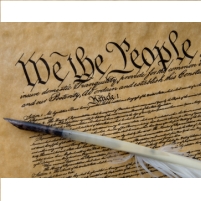U.S. Constitution Losing Influence as Model for Other Nations
Wednesday, February 08, 2012

Once the standard by which new governments modeled their own public contract with citizens, the U.S. Constitution is losing its appeals with other countries, particularly regarding human rights.
Three decades ago, it was estimated that 160 nations had modeled their constitution after that of the United States.
Today, however, “constitutional similarity to the United States has clearly gone into free fall,” according to a new academic study appearing in the New York University Law Review. “Over the 1960s and 1970s, democratic constitutions as a whole became more similar to the U.S. Constitution, only to reverse course in the 1980s and 1990s.
“The turn of the twenty-first century, however, saw the beginning of a steep plunge that continues through the most recent years for which we have data, to the point that the constitutions of the world’s democracies are, on average, less similar to the U.S. Constitution now than they were at the end of World War II.”
The authors of the study, David S. Law and Mila Versteeg, cite several reasons for the change, including:
· The U.S. Constitution “offers relatively few enumerated rights. While the catalog of rights found in other constitutions has steadily grown, the laconic U.S. Constitution has not added any rights at all over the last century.”
· “Among the relatively few rights that the U.S. Constitution does contain are provisions that happen to be rare at a global level. One is the Establishment Clause: today, only about one-third of the world’s constitutions provide expressly for a separation of church and state.99 Another is a right that is now so rare that it has become practically sui generis—namely, the right to bear arms. The only other constitutions in the world today that still feature such a right are those of Guatemala and Mexico.”
· “The U.S. Constitution is, instead, rooted in a libertarian constitutional tradition that is inherently antithetical to the notion of positive rights.” For example, whereas more than 90% of the world’s constitutions insure women’s rights, the issue is not addressed in the U.S. Constitution. Likewise, the vast majority of constitutions insure the right to social security, health care and food, these are not considered protected rights in the United States.
· The U.S. Constitution, the oldest still in force in the world, is extremely difficult to amend (only one amendment in the last forty years) is considered obsolete for newly emerging democracies.
Speaking last week in Egypt, Supreme Court Justice Ruth Bader Ginsburg said that in regards to human rights she “would not look to the United States Constitution if I were drafting a constitution in the year 2012.” Instead, she recommended the South African Constitution, the Canadian Charter of Rights and Freedoms or the European Convention on Human Rights.
-David Wallechinsky, Noel Brinkerhoff
To Learn More:
‘We the People’ Loses Appeal With People Around the World (by Adam Liptak, New York Times)
The Declining Influence of the United States Constitution (by David S. Law and Mila Versteeg, New York University Law Review)
- Top Stories
- Unusual News
- Where is the Money Going?
- Controversies
- U.S. and the World
- Appointments and Resignations
- Latest News
- Trump to Stop Deportations If…
- Trump Denounces World Series
- What If China Invaded the United States?
- Donald Trump Has a Mental Health Problem and It Has a Name
- Trump Goes on Renaming Frenzy






Comments